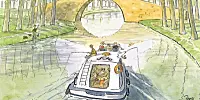-
France puts forward 18 plans to simplify life for disabled people
The measures aim to streamline administrative procedures and reduce delays
-
Letters: My French admin nightmare due to name error
Reader says the problem arose because officials do not have an ü or umlaut key
-
Make sense of… boating in France
Summer is almost upon us and many people will be taking to the water once more. We recap what paperwork you might need to get afloat
Make sense of: Maisons de Services in France
If you live in a rural area and need help with administrative procedures related to public services – such as social services, job centres, public transport, family benefits, energy, health prevention and even the post – you might face a long drive to one of their offices.

However, there may be a Maison de Services au Public (MSAP) near you to help.
These centres allow people living outside France’s main towns and cities to get help, rather than having to visit the offices of the service they need.
Last June, there were 1,340 MSAP offices throughout the country. After last year’s Grand Débat, when President Macron toured France listening to mayors and citizens, he promised there would be 2,000 by 2022.
Their name will change to Maison France Service. A total of 460 were due to open at the beginning of this year.
The government has also promised to give each one €30,000 a year to contribute to running costs. They can be run by a local authority, an association, or La Poste.
We visited Montignac in the Dordogne, which has had an MSAP since 2008.
It is run by the Communauté de Communes de la Vallée de l’Homme and is the only one for a sector with 26 communes and a population of 16,000.
Another is set to open in nearby Le Bugue this year.
The centre has one part-time employee, Nathalie Lafon, who has worked there since it opened. She said she sees or talks on the phone to 250 to 300 clients a month, and there is a need for this type of service in rural areas.
She said: “There are many people who are not sure how to apply for a driving licence online, or what procedure to follow when they have lost a job and need to sign up to Pôle Emploi.
They often do not know that you do not need to go to a Pôle Emploi office straightaway but that you first apply online or by telephone, and only have to go once you are registered and are assigned an advisor.
“I can help with the initial application.
“That is just one of the many examples of the type of support I can give to people.
“I can act as a human interface between them and the public services.”
She said many requests come from people who do not know how to use the internet to fill in forms, scan in documents or sign up to a service.
“Even young people, who are on their smartphones all the time, are puzzled when it comes to using the internet for administrative procedures.
“Others may have a computer at home, but cannot afford to sign up to an internet service on top of that. Here we have two linked-up computers they can use. We also run workshops for people to learn computer skills.”
She helps people understand what rights they are eligible for, such as social security benefits, or what to do if they have not received a benefit.
“Someone might come in who has not had their monthly CAF payment. I can look to see if this is because they haven’t renewed their demand and if this is the case, I can tell them what papers to send off. If this is not the case, I can ring the CAF and ask them to look into it.”
She works in partnership with bodies such as the CAF and Pôle Emploi, so they are used to answering her calls.
“I also help people who have just moved to the area. I can tell them how to sign up to schools, school transport and what is on offer in the town.”
She said people can just pop in, but it is better to ring and make an appointment.
The offices are rented from the town’s mairie by the Communauté de Communes and are in the actual town hall building, which makes it easier for people to find.
Other associations and services also use the facilities, though they are not there permanently.
These include Mission Locale, which helps young people who have dropped out of the school system or who want to change career direction; Infodroit, where a qualified legal expert gives free advice by appointment once a month; Que Choisir for consumer advice; and Association Alzheimer Dordogne.
Services vary from centre to centre. They can be situated in mairies, tourist offices, health centres and other public buildings. Some are even itinerant in very rural areas, moving from village to village, called Bus France Service.
The government has said new regulations will apply to the Maisons France Service, after criticisms that the existing MSAPs vary in quality.
Each one will have at least two trained people and there must be a minimum level of service including partnerships with CAF, ministers of the interior, justice and public finances, Caisse National d’Assurance Maladie, Caisse Nationale d’Assurance Vieillesse for pensions, Mutualité Sociale Agricole, for farmers’ social security, Pôle Emploi, and La Poste.
They must open at least 24 hours a week. MSAPs have until the end of 2021 to qualify as a Maison France Service.
To find one near you see:maisondeservicesaupublic.fr.
The image here was drawn by artist Perry Taylor. For more of his work see www.perrytaylor.fr
























